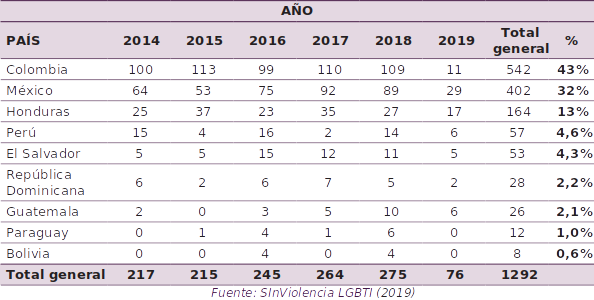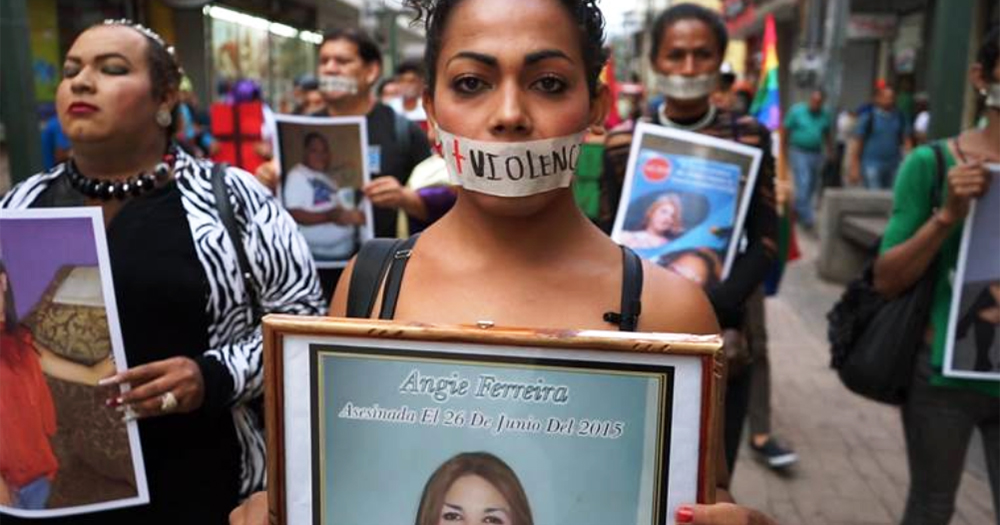“El Prejuicio No Conoce Fronteras” is a report that has pulled together comprehensive data on the killing of LGBT+ people in Latin America and the Caribbean for the first time ever.
The “Red Regional de Información Sobre Violencias LGBTI en América Latina y el Caribe”, which was formed by 10 LGBT+ organisations, have created “Sin Violencia LGBTI”. The project coordinated by Colombia Diversa is a database on homicides of LGBT+ people in Latin America and the Caribbean and they have just released their first report.
Authors of the report, Lucía Baca and David Alonzo of Colombia Diversa, spoke to Jim Loughran of Front Line Defenders about their findings stating in the last five years, 2,900 LGBT+ people have been killed in 10 Latin American and Caribbean countries.
The homicide victims are mostly gay men and transgender women in their 20s and the majority of the killings, 89%, took place in Brazil, Colombia and Mexico with Brazil alone seeing more than half of these murders with 1600 killed meaning one LGBT+ person is killed there almost daily.
While Brazil has witnessed the most murders, Honduras, with a much smaller population, has the highest number of killings per capita. Baca and Alonzo add that: “The figures are an underestimate given the stigma across the region of being identified as LGBTI, even in death, and the failure of many countries, such as Paraguay and Bolivia to collect data in a systematic way.”
Steps have been taken to create more equal societies within this region with Mexico introducing legislation to extend social welfare entitlements to same sex couples this year and the Constitutional Court in Colombia has made more than 120 rulings to enforce the rights of LGBT+ people.
Furthermore, Bogota, Colombia’s capital, is marketing itself as the go to city for LGBT+ tourism with the International Tourism Trade Fair (FITUR) picking Colombia as the best LGBT+ tourist destination in 2017.
However, according to Baca and Alonzo, the overall situation across the region is actually going backwards rather than progressing. Stating that all the celebrated progress has provoked well-orchestrated and well-funded conservative backlash that seeks to eliminate any attempt to promote equality and challenges any reference to gender or sexual orientation in public policy.
Paraguay, one of the leaders in the anti-LGBT+ rights campaign in bodies such as the ‘Organisation of American States’ and the ‘General Assembly’, banned any reference to gender studies in public education in a move by the Department of Education and Science in 2017.
In Brazil, the Bolsonaro government introduced Decree 9.883 / 2019 to abolish the National LGBTI Council, during the celebration of the 50th anniversary of the Stonewall Riots, with President Bolsonaro being quoted as telling a journalist: “we can’t let this place become known as a gay tourism paradise. Brazil can’t be a country of the gay world, of gay tourism. We have families.”
With the actions of the president, it is hard to argue that it is a coincidence that Brazil has the highest number of LGBT+ killings in Latin America, as seen in the table below, the vast majority of which are never properly investigated. Bolsonaro’s power is by no means the single causing factor to this problem which predates his presidential status, however, his hateful rhetoric has contributed to the legitimisation of violence and discrimination against LGBT+ people in Brazil.

Similarly to Bolsonaro, Jimmy Morales, former president of Guatemala, told the General Assembly of the United Nations in 2018 that Guatemala was a country that believed in God and the right to life from the moment of conception while in the same breath rejecting the legalisation of gay marriage.
Baca and Alonzo state that the root cause of the violence is discrimination against difference, an experience which is also shared by indigenous peoples and afro-descendant communities. They explain how the killings of LGBT+ people, particularly when that killing is accompanied with extreme cruelty, is a tool used to insight fear and send a message to individuals, as well as societies as a whole, that deviating from the norm is to insight danger upon oneself.
They go on to explain that this lack of a concerted state response means that there are no clear lines of authority to document or investigate LGBT+ killings, resulting in members of the community having a lack of trust in state agencies. And although the low number of killings in Paraguay, Bolivia and Peru may create the illusion that the situation is better there, the anti-gay stigma is so strong that LGBT+ people have rendered themselves invisible to survive.
The take away from the report is that these killings aren’t coming out of the blue, rather the act of homicide is the last step in a long line of discrimination and violence. LGBT+ people are routinely denied access to basic human rights such as health care, education and jobs based solely on their gender identity or sexual orientation. The struggle for LGBT+ rights in Latin America and the Caribbean is a continuing battle for organisations like “Sin Violencia LGBTI” is one that should concern the international community.
© 2019 GCN (Gay Community News). All rights reserved.
Support GCN
GCN is a free, vital resource for Ireland’s LGBTQ+ community since 1988.
GCN is a trading name of National LGBT Federation CLG, a registered charity - Charity Number: 20034580.
GCN relies on the generous support of the community and allies to sustain the crucial work that we do. Producing GCN is costly, and, in an industry which has been hugely impacted by rising costs, we need your support to help sustain and grow this vital resource.
Supporting GCN for as little as €1.99 per month will help us continue our work as Ireland’s free, independent LGBTQ+ media.
